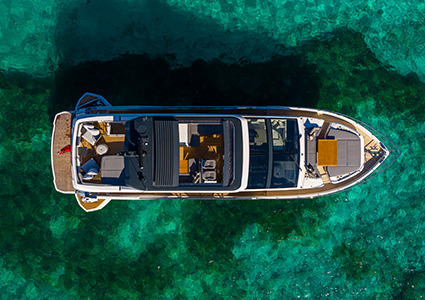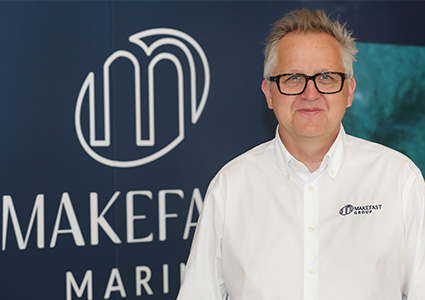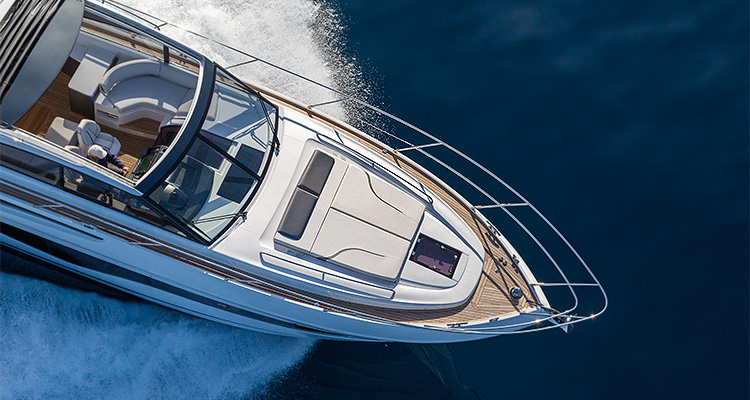Makefast champions engineering with premium stainless-steel hardware and innovation in marine systems
Bill and Brenda Brown, who have a passion for engineering, were determined to put it to good use when they decided to create innovative solutions for the marine industry. Their first product, a ring and turnover for sailmakers, was unique in that it could be pressed rather than hand sewn. This original design led to the establishment of Makefast Ltd in Hampshire in 1974. Now located in Wales, the renowned design and manufacturing company currently produces a wide range of equipment for the marine and safety industries. Over the years, its founders’ commitment to quality and customer satisfaction has been a driving force behind Makefast’s growth and success. Chris Brown, CEO, shares an overview of the family-owned enterprise.
 “As designers and manufacturers, we mainly operate within the marine and safety markets, delivering a wide range of safety hardware, such as buckles, links, and rings, and marine hardware such as deck fittings. We also manufacture sophisticated marine systems for boats like sunroofs and awnings. Both safety and marine applications have stringent specifications that we must comply with. As such, we use marine grade 316 stainless steel, a highly rust proof material. The other aspect of the marine side is the quality, which needs to be of the first class, because people buying a high-quality yacht are particularly looking for a premium finish,” he begins.
“As designers and manufacturers, we mainly operate within the marine and safety markets, delivering a wide range of safety hardware, such as buckles, links, and rings, and marine hardware such as deck fittings. We also manufacture sophisticated marine systems for boats like sunroofs and awnings. Both safety and marine applications have stringent specifications that we must comply with. As such, we use marine grade 316 stainless steel, a highly rust proof material. The other aspect of the marine side is the quality, which needs to be of the first class, because people buying a high-quality yacht are particularly looking for a premium finish,” he begins.
Utilizing high-quality material is but one facet of Makefast’s forward-thinking approach, complemented by its philosophy of continuous improvement and investments in cutting-edge equipment. “This year, we have bought multiple lathes to support the high volume of turning operations we perform. Additionally, we are in the process of purchasing a semi-automated wire former to efficiently bend smaller items such as D-rings and triangles. Wire formers are fascinating to watch – they take a wire coil, straighten it, and then bend it to create the desired shape. Another substantial investment we made was in a state-of-the-art laser cutter machine, with a nitrogen generator to support it. At Makefast, we are always looking to upgrade our equipment to deliver high-quality products to our customers,” says Chris.
Adopting automation
Along the same lines, Makefast is also adopting automation to optimize its processes. “In the past, we have done a lot of automation design and building in-house, such as semi-automated rotary welding tables. At the moment, we have a cobot on trial and are planning to lease it for a year to evaluate how it fits within our operations. Since we favor manufacturing in small batches, it can be a bit more difficult for us to implement automation, but we are actively exploring how it could work for us as we recognize it is the way forward. To do so successfully, we need to make the right investment at the right time, and there is a learning curve involved. Hence, if we start implementing automation now, with the existing expertise of our staff, particularly on the programming side, we will hopefully build up our knowledge quickly. On the other hand, although we have always practiced lean manufacturing, we are currently focusing on it even more, going through each department to drive further efficiencies and increase staff engagement. By combining automation with lean manufacturing principles, we can achieve a win-win scenario for our business,” Chris elaborates.
Undoubtedly, the successful implementation of automation and new technology at Makefast can largely be attributed to the support of its talented staff. On this note, Chris praises the talents of Makefast’s workforce, highlighting the culture fostered within the organization. “With excellent designers and engineers, as well as skilled workers across all departments, we consider ourselves very fortunate to have a highly qualified talent base. I believe that we excel at retaining our staff, as a significant portion of our people have been working at Makefast for a long time. In fact, some have been with us since our move to mid-Wales in 1989, which was accomplished with the assistance of the Welsh Development Board.
Family focus
“It is important to note that we remain a family business, as Makefast was founded by my parents, who are still involved and still just as passionate. My brother, a strong engineer, has great knowledge on the technical side, while I am much more qualified on the administrative side. This makes for a good partnership, since we complement each other. Additionally, my nephew works here, as does another nephew’s girlfriend. There also are many other families involved in the company, besides my own. For instance, there are sons and daughters working here, as well as husband and wives and brothers and sisters, which creates a nice, family-like environment.”
strong engineer, has great knowledge on the technical side, while I am much more qualified on the administrative side. This makes for a good partnership, since we complement each other. Additionally, my nephew works here, as does another nephew’s girlfriend. There also are many other families involved in the company, besides my own. For instance, there are sons and daughters working here, as well as husband and wives and brothers and sisters, which creates a nice, family-like environment.”
This close-knit culture is also attractive to young people looking to enter the manufacturing industry, as Chris points out: “We strive to make Makefast a pleasant place to work to attract local talent. As part of our efforts to promote engineering as a profession, we are encouraging apprenticeships. Currently, we have five students on work experience. These brilliant young people are eager to learn engineering, and I am hopeful that they are going to join us as apprentices at the end of this year. Moreover, we are promoting ourselves locally to parents, so that they can realize that Makefast is a great place for their sons and daughters to work. I place the emphasis on daughters here because we strive to encourage women to pursue engineering. One of the girls who came for work experience with us is very passionate about engineering, which, as a father of two daughters, I find inspiring. We are committed to doing anything we can to encourage women to join the engineering field.”
Green strategy
Turning to sustainability, Chris reveals Makefast’s approach to reducing the environmental impact of its operations. “While we are still working on a formal policy, we have already made great strides towards being more sustainable. For instance, we have installed solar panels, and our sales team uses electric vehicles. Although a couple of our vans still have combustion engines, we will probably transition them to hybrid or electric vehicles once their leases expire.
“To limit waste, we use a cardboard shredder to turn any incoming cardboard boxes into filler material for our packages. Additionally, we package our awnings (which are one of our best-selling products in the US) in recyclable cardboard crates. We do have a slight advantage in that the main material we use is stainless steel, which is infinitely recyclable. Likewise, when it comes to plastic, we predominantly use nylon, most of which is also recyclable. Furthermore, we are always looking for ways to reduce our carbon footprint and have already made good progress. Therefore, while we are doing a lot in terms of sustainability, we are aware that we need to formalize our strategy and initiatives, partly because customers are increasingly asking for it,” he concludes.
By integrating new machinery and automation while reducing its impact on the environment through recycling, Makefast is raising the bar for engineering excellence. With these optimizations in motion, the company is poised for further growth.
